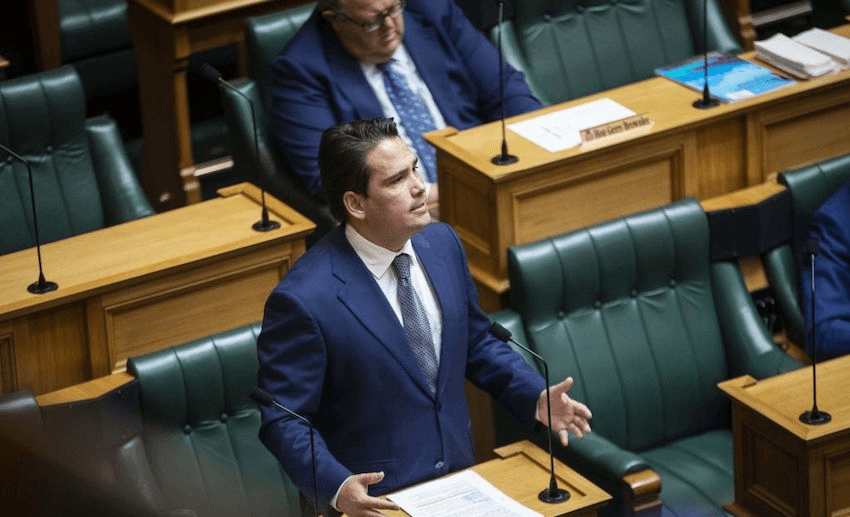Budget 2020: Simon Bridges led the critiques, while Winston Peters got personal.
Grant Robertson’s budget spends too much money, delivers too little help to businesses struggling due to Covid-19 and will leave future generations swamped by debt, opposition leaders have argued.
The finance minister and the prime minister, Jacinda Ardern, faced enormous expectations before unveiling a budget designed to help New Zealand through the worst economic crisis since the Great Depression. There were hopes that the budget would save over 100,000 jobs at risk, tackle the threat of climate change and leave the country a fairer place than it was before the arrival of the coronavirus.
Ardern said she would like to see the parliament “come together as politicians”, and avoid the temptation to “retrench into our old patterns”. That wish went unfulfilled, with angry rhetoric coming from her own benches, as well as the opposition’s.
National Party leader Simon Bridges found little to celebrate in Robertson’s enormous spending plan.
He warned that a “tsunami of debt” was due to swamp the country’s finances. The budget expects the country’s debt to soar to nearly 54% of GDP before New Zealand’s books are finally brought back into balance in 2028.
The Treasury forecasts the government’s surplus last year will turn into a $28 billion shortfall this year, as tax receipts dry up and billions are shovelled out the door in wage supports.
“Having gone hard and early on lockdown, we went soft and slow on the economy,” Bridges told the house after a 40 minute budget speech by the finance minister.
The opposition leader warned that after flattening the curve of Covid-19, New Zealand needs to avoid flattening the economy.
Bridges and Act leader David Seymour said they were concerned that the Ardern government’s newly created $50 billion fund to rescue the economy from recession has allocated too much money to pet projects like new trains and ferries.
“We must not spend more than we need to in poorly prioritised areas. After health and after education, we need only ask one question about taxpayer’s money: does it save jobs?” said Bridges.
The National leader called the fund, which is the centrepiece of the government’s economic rescue package, a “slush fund” that could be doled out before an election scheduled for late September. Nearly $20 billion in the fund was not allocated in the budget, leaving a large amount for future announcements by the cabinet.
National has proposed sending GST rebates of up to $100,000 to small businesses to help with wage bills and rents. Bridges singled out the lack of supports for the ailing tourism sector as a major concern. “I think jobs are crucial and I don’t see ultimately here a plan for jobs and creating growth in our economy” he said.
Reiterating her focus on “jobs, jobs, jobs”, the prime minister called for the opposition to work with the government, while chiding Bridges for assuming “it’s business as usual”.
Ardern promised that the budget would leave New Zealand a better place than it was before Covid-19. The government has promised to provide more skills training for free, building 8,000 more houses with a new $5 billion construction fund, and finance thousands of new positions to clean up waterways and control predators.
“I give my commitment to New Zealanders that they will see us apply the same unrelenting focus we have had on our health response to Covid-19, to our economic response,” she said.
New Zealand went into the crisis with a healthy economy, low unemployment and an enviably small government debt by international standards. Even after the government’s projected near decade of deficits, New Zealand’s debt burden would still be smaller than that of the US, UK and Canada currently.
According to Robertson, years of surpluses and sacrifices by New Zealanders can now be put to use. “The rainy day has arrived and we are well prepared,” he said, adding that the budget’s Covid-19 fund is the largest expenditure in the country’s modern history.
Despite the billions in new spending, New Zealand is avoiding some of the choices made by other countries. There will be no massive programme of sending cheques to the unemployed, there are no announced changes to the tax system, no cuts to public services and no new pocket cash for the middle class.
Act’s Seymour said the government chose the wrong way to rebuild. Instead of slashing taxes and cutting regulations as he would prefer, the Labour-led coalition has looked to spending borrowed money.
“They are trying to plan an economy from the Beehive and I have no doubt that the MPs on the government benches are sincere, they really do believe they can get New Zealanders back to work by borrowing and spending money,” he said. “Countries that look inwards for jobs and growth find neither.”
The deputy prime minister and New Zealand First leader, Winston Peters, said the government had no playbook to follow as it responds to the economic crisis expected to wash over New Zealand in the coming months and has looked to history, including US President Franklin Roosevelt response to the Great Depression with the New Deal for inspiration.
“All the rules of fiscal prudence are now obsolete,” announced Peters, during an address in which he frequently stopped to hector opposition members.
In between calling on New Zealanders to suspend their ideologies and reiterating the government’s commitment to spend whatever amount of money is necessary to support businesses, he told Bridges to “get a haircut, and a real job”.

